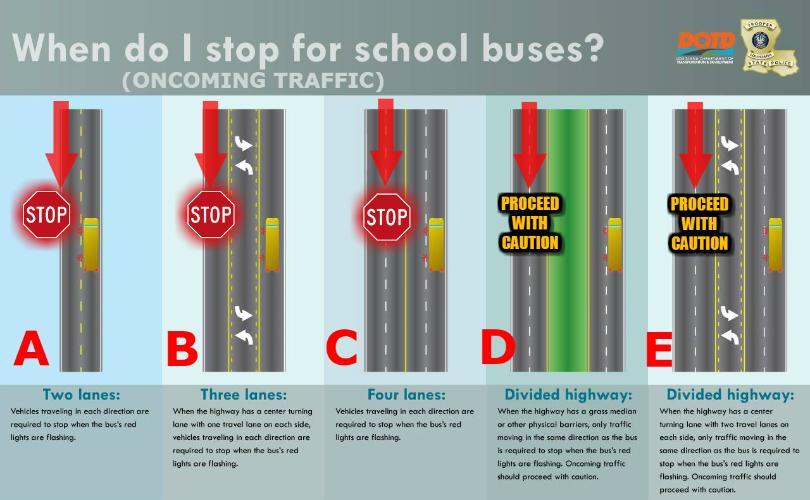Never pass a stopped school bus regardless of whether you are driving behind the bus or driving towards it. When the bus stops to let children get on or off, you will see flashing lights and stop signs that come out from the sides of the bus. Expect children to be in the area. Wait until the bus begins to move, and then proceed with caution as children may still be along the roadside.
Tag Archives: school
MINIMIZING MORNING MADNESS
 It’s important to have effective morning routines so children get off to school without stress. Older children can help plan their routines.
It’s important to have effective morning routines so children get off to school without stress. Older children can help plan their routines.
Here are some specific ideas for minimizing morning madness on school days:
- Prepare the night before. Make lunch, pack backpacks, and set out clothes.
- Set up a launching pad—a place near the door for children’s backpacks, coats, shoes, hats and gloves so no time is wasted looking for these items.
- Wake up at least half an hour before the kids. Shower, get dressed, have your coffee/breakfast, and be ready!
- Have a reliable wake up system for the kids. An alarm clock or clock radio is good.
- Stagger wake up times for the kids. Pre-teen and teenagers usually need more time to shower and groom.
- Younger kids should bathe the night before to reduce bathroom congestion.
- Have kids choose what they are wearing the night before. Limit choices and make sure everything is neat and clean.
- Don’t rush the children! Make sure there is enough time to wash, dress, eat breakfast, comb hair and brush teeth. Start earlier if you need to.
- Avoid turning on the TV. Kids can waste a lot of time watching TV or playing. These activities should be permitted only if they are completely ready for school.
- Don’t skip breakfast! Hungry kids can’t concentrate in school.
- Remind kids to use the bathroom just before leaving for school. Lots of kids don’t like to use the school bathroom.
- Wish the kids a great day. Give them each a hug!
Au Pair in America Explorer for January
Johanna K from Germany in Marianne Grandin’s New Canaan, CT cluster
What is an Au Pair in America Explorer?
These are au pairs who embrace all aspects of the au pair program (volunteering, attending monthly cluster activities, attending webinars, discovering new places) and for those going above and beyond, sharing their culture through Global Awareness. For complete details: https://www.aupairinamerica.com/pdf/apia-explorer.pdf
Back to School Planning
Back to school time is here. This can mean changes to the au pair schedule and possibly to the duties. It is very important to communicate these changes to avoid problems.

Here is a list of topics to consider discussing:
- Au pair’s work schedule
- The children’s school and activity schedules
- Where the children get dropped off and picked up and who will be doing this
- What to do if a child is staying home sick, late to school, does not get off the bus (if they are supposed to)
- Driving laws regarding stopping for school buses
- How to tell if school has been canceled or delayed for bad weather
- Add the au pair to your list of people allowed to pick up the kids from school and explain the process
- What to pack for lunch
- The routine after school (do they have free time before starting homework, what to give for a snack, any chores, where do they put their backpacks & lunchboxes)
- How to communicate about what’s going on at school. Your Kids in Care logbook from Au Pair in America can be a great two-way communication tool for keeping track of schedules, afterschool activities and day to day info that needs to be transferred between host parents and au pair.
- If your au pair will be the one going through the children’s backpack and helping with homework, consider designating an area for putting things that need to be read and/or signed by parents.
Here are some Printable Fill-in-the-Blank School Notes for parents. You can print these out and have them ready for times when the kids are absent, late, have an early dismissal or you need to give permission for something.
Check out Au Pair in America’s Pinterest School Tips and Ideas pinboard for things like organization ideas, back to school traditions, printable lunch box notes, and fun lunch recipes.
THE BACKPACK– Keeping It Organized
 The back pack is very important to review every day. It is one of the important links between school and home. Backpacks quickly become disorganized and notices missed if not emptied every day. Here is a suggested daily routine that you can follow, or supervise your host children as they do it, depending on their age(s):
The back pack is very important to review every day. It is one of the important links between school and home. Backpacks quickly become disorganized and notices missed if not emptied every day. Here is a suggested daily routine that you can follow, or supervise your host children as they do it, depending on their age(s):
- After the student arrives home, empty the backpack on a table.
2. Find the homework. Set it out in the homework area with all the supplies needed to complete the homework.
3. Put the lunch box in the kitchen. Empty it, discard the garbage, and see if the child actually ate the lunch that was packed. Wipe out the lunch box. Let host parents know what was not eaten.
4. Find all notices sent home with the child. Find anything that needs to be filled out by the parents. If it is your responsibility to keep track of activities, put them on the calendar now. If not, make sure the parents see them.
5. Make sure permission slips, fundraiser notices, book orders, photo notices and anything else that must be signed is done on time. Make sure these items get back in the backpack and the child turns them in on time. If a signed form and money is still in the back pack when the child comes home, the child forgot to give it to the teacher. Remind the child, tell the parent.
6. All completed homework should be put in the homework folder in the backpack as soon as the homework is completed. Make sure there is a sturdy folder to put the homework in; this way the child knows where it is when he or she arrives at school, and the homework will stay neater 🙂
7. In the morning, recheck for homework. Is it in the folder? Are all permission slips and notices requiring money in the backpack?
8. Make lunch and put the lunch box in the backpack. If the lunch box is in the backpack there is less chance it will be left on the bus.
9. Does the child need to bring anything else to school that day? Maybe he or she needs gym clothes, or something for show and tell. Put it in the backpack!
10. At the end of the week, make sure all work sent home is placed out for the parents to see. Any dirty gym clothes are taken out of the backpack and put in the laundry. The back pack and the lunch box should be wiped out and kept clean.
BUS STOP SAFETY
 School is Starting – Be Safe at the Bus Stop
School is Starting – Be Safe at the Bus Stop
- Be on time to the bus stop so that you and your host kids get there safely.
- Walk and hold hands to the stop.
- Stand on the sidewalk or the grass, not in the street.
- Wait until the bus comes to a complete stop before the children walk to the door.
- Let the bus driver open the door. Do not try to push it open.
- Remind the children to sit on the bus and not stand. If there are seat belts, remind them to put them on.
- Let the bus leave before you do, just in case there is a problem.
- Be at the afternoon return bus stop in plenty of time, before it comes. There are times when it will be early.
- The driver is not allowed to let small children off the bus unless someone greets them, so if you are not there the children will be taken back to school. BE THERE.
- The bus driver will not leave until you are safely on your side of the street, so if you need to cross the street, do it in front of the bus.
MINIMIZING MORNING MADNESS
 It is important to have a good morning routine with your host kids on school days! Here are some tips to help:
It is important to have a good morning routine with your host kids on school days! Here are some tips to help:
- Prepare the night before by making lunch, pack backpacks, and set out the clothes.
- Set up a launching pad near the door for kids’ backpacks, coats, shoes, hats & gloves so no time is wasted looking for these items.
- Wake up at least one hour before the kids, eat, have coffee and get dressed. BE READY!
- Make sure you know how and when to wake up the kids.
- Stagger wake up times if you can. Pre-teens and teenagers need more time in the morning to shower and get ready.
- Younger kids should bathe the night before whenever possible.
- Make sure the kids pick out what they are wearing the night before. Limit their choices, make sure everything is clean and ready to wear.
- Do not rush kids. Make sure they have enough time to dress, wash, comb their hair, brush their teeth and eat breakfast!
- Avoid turning on the TV. Kids waste a lot of time in the morning watching TV and playing. These activities should be avoided and only saved if everything else is done!
- Never let them skip breakfast. Hungry kids can’t concentrate in school.
- Remind kids to use the bathroom just before leaving for school. Lots of kids don’t like to use the school bathroom.
- Wish the kids a good day. Give them a hug! Let them know you will be waiting for them when they get off the bus or at the school when they are done!
BUS STOP SAFETY
 School has Started – Be Safe at the Bus Stop
School has Started – Be Safe at the Bus Stop
- Be on time to the bus stop so that you and your host kids get there safely.
- Walk and hold hands to the stop.
- Stand on the sidewalk or the grass, not in the street.
- Wait until the bus comes to a complete stop before the children walk to the door.
- Let the bus driver open the door. Do not try to push it open.
- Remind the children to sit on the bus and not stand. If there are seat belts, remind them to put them on.
- Let the bus leave before you do, just in case there is a problem.
- Be at the afternoon return bus stop in plenty of time, before it comes. There are times when it will be early.
- The driver is not allowed to let small children off the bus unless someone greets them, so if you are not there the children will be taken back to school. BE THERE.
- The bus driver will not leave until you are safely on your side of the street, so if you need to cross the street, do it in front of the bus.
THE BACKPACK— Keeping it Organized
 The back pack is very important to review every day. It is one of the important links between school and home. Backpacks quickly become disorganized and notices missed if not emptied every day. Here is a suggested daily routine that you can follow, or supervise your host children as they do it, depending on their age(s):
The back pack is very important to review every day. It is one of the important links between school and home. Backpacks quickly become disorganized and notices missed if not emptied every day. Here is a suggested daily routine that you can follow, or supervise your host children as they do it, depending on their age(s):
- After the student arrives home, empty the backpack on a table.
2. Find the homework. Set it out in the homework area with all the supplies needed to complete the homework.
3. Put the lunch box in the kitchen. Empty it, discard the garbage, and see if the child actually ate the lunch that was packed. Wipe out the lunch box. Let host parents know what was not eaten.
4. Find all notices sent home with the child. Find anything that needs to be filled out by the parents. If it is your responsibility to keep track of activities, put them on the calendar now. If not, make sure the parents see them.
5. Make sure permission slips, fundraiser notices, book orders, photo notices and anything else that must be signed is done on time. Make sure these items get back in the backpack and the child turns them in on time. If a signed form and money is still in the back pack when the child comes home, the child forgot to give it to the teacher. Remind the child, tell the parent.
6. All completed homework should be put in the homework folder in the backpack as soon as the homework is completed. Make sure there is a sturdy folder to put the homework in; this way the child knows where it is when he or she arrives at school, and the homework will stay neater 🙂
7. In the morning, recheck for homework. Is it in the folder? Are all permission slips and notices requiring money in the backpack?
8. Make lunch and put the lunch box in the backpack. If the lunch box is in the backpack there is less chance it will be left on the bus.
9. Does the child need to bring anything else to school that day? Maybe he or she needs gym clothes, or something for show and tell. Put it in the backpack!
10. At the end of the week, make sure all work sent home is placed out for the parents to see. Any dirty gym clothes are taken out of the backpack and put in the laundry. The back pack and the lunch box should be wiped out and kept clean.
MINIMIZING MORNING MADNESS
 It’s important to have effective morning routines so children get off to school without stress. Older children can help plan their routines.
It’s important to have effective morning routines so children get off to school without stress. Older children can help plan their routines.
Here are some specific ideas for minimizing morning madness on school days:
- Prepare the night before. Make lunch, pack backpacks, and set out clothes.
- Set up a launching pad—a place near the door for children’s backpacks, coats, shoes, hats and gloves so no time is wasted looking for these items.
- Wake up at least half an hour before the kids. Shower, get dressed, have your coffee/breakfast, and be ready!
- Have a reliable wake up system for the kids. An alarm clock or clock radio is good.
- Stagger wake up times for the kids. Pre-teen and teenagers usually need more time to shower and groom.
- Younger kids should bathe the night before to reduce bathroom congestion.
- Have kids choose what they are wearing the night before. Limit choices and make sure everything is neat and clean.
- Don’t rush the children! Make sure there is enough time to wash, dress, eat breakfast, comb hair and brush teeth. Start earlier if you need to.
- Avoid turning on the TV. Kids can waste a lot of time watching TV or playing. These activities should be permitted only if they are completely ready for school.
- Don’t skip breakfast! Hungry kids can’t concentrate in school.
- Remind kids to use the bathroom just before leaving for school. Lots of kids don’t like to use the school bathroom.
- Wish the kids a great day. Give them each a hug!

